Plastic pollution is one of the most pressing environmental challenges facing mankind today. The annual production of plastics worldwide has exceeded 430 million tons, with disposable plastics accounting for up to one-third of the total, of which 70% is directly discarded into the ocean, air and soil, and less than 10% is recycled. There is no doubt that plastic pollution is causing serious damage to the Earth's environment, human and animal health.
According to the latest data from the United Nations Environment Programme, by implementing circular economy measures, we can expect to reduce the amount of plastics entering the oceans by more than 80 percent by 2040, reduce the production of virgin plastics by 55 percent, and simultaneously reduce greenhouse gas emissions by 25 percent. In order to cope with the increasingly serious plastic pollution, Dell has been practicing the concept of green, recycling and sustainable development for many years while maintaining a stable business, recycling and reusing waste plastics, and innovating the materials of products and packaging, in order to minimize the harm caused by plastic products to the environment and contribute to the sustainable development of the earth.
The most destructive and persistent plastic pollution is microplastics. This plastic particles less than 5 mm in diameter, also known as "sea PM2.5", can cause great harm to the biological environment, especially marine life. As a result, Dell is using more of the seaward plastic recycled from beaches and coastal areas in its products and packaging, seeking to keep plastic in the circular economy and out of the ocean. In 2017, Dell debuted the use of Kumi plastic in product packaging, and in 2022 will expand the use of the material from packaging to products for fans and fan enclosures for some laptops and workstations. Currently, more than 220,000 kilograms of Dell's product packaging is made from ocean plastic, accounting for 25 percent of its use. Dell has become an industry leader in the recycling of ocean plastic waste, achieving its commitment to increase the annual use of ocean plastic by 10 times by 2025, four years ahead of schedule.
In order to reduce the production and use of virgin plastics, people have been actively looking for environmentally friendly alternatives to plastics, and the emergence of bio-based plastics is becoming a hope for the plastics industry to move from pollution to green. Over the years, Dell has continued to drive a consensus throughout the supply chain to use renewable, bio-based plastics in its products. The new Latitude 5000 series and Precision 3000 series use bio-based plastics made from Tall Oil. Tall oil, a waste by-product of the paper-making process, can be used as a substitute for oil in the manufacture of plastics. Bio-based plastics derived from castor seeds, a non-food crop, can also be used as a plastic substitute in the manufacture of laptop computer cases and shock-absorbing rubber feet. Currently, Dell's laptop parts are more than 80% recyclable and desktop parts are more than 85% recyclable, which can effectively reduce the use of disposable plastics in products and reduce the environmental pollution and resource consumption in the manufacturing process.
Enhancing the recycling of materials is also an effective means of sustainably reducing plastic pollution. Since the launch of the first OptiPlex desktop made from recycled plastic in 2007, Dell has been working to promote the recycling of materials. Today, Dell has established a robust recycling process that collects, disassembles and pellets plastic materials for use in new parts on new products. This program provides materials for more than 125 different models. The new Latitude 5000 series features the largest variety of innovative sustainable materials to date, including recycled plastics, recycled carbon fiber, renewable materials and seaward plastics.
OptiPlex, Precision and Latitude products also use varying percentages of post-consumer recycled (PCR) plastic. In the future, Dell will continue to look for new ways to increase this percentage.
To further expand the design boundaries of PC products in sustainability, Dell launched Concept Luna - that is, to explore a variety of revolutionary PC design concepts that make products more durable, easier to repair and recycle, thereby saving resources, significantly reducing carbon emissions and allowing more recycled materials to circulate in the economy. In late 2022, Dell further updated and refined the Concept Luna modular design, combining data-driven innovation with sustainable PC design. The upgraded Concept Luna's entire design eliminates the need for adhesives and cables, reducing disassembly time to minutes.

Concept Luna
Today, Dell is working toward its ESG goals by committing to recycling one equivalent product for every product a customer purchases by 2030, with all product packaging and more than half of a product's raw materials being made from recycled or renewable materials. In order to achieve these goals, Dell is firmly committed to innovation to drive the circular economy, expand the use of recycled and renewable materials and implement them throughout the business ecosystem. In this never-ending journey of sustainability, Dell will work alongside its partners to build a better future for people and nature through the power of technology.

